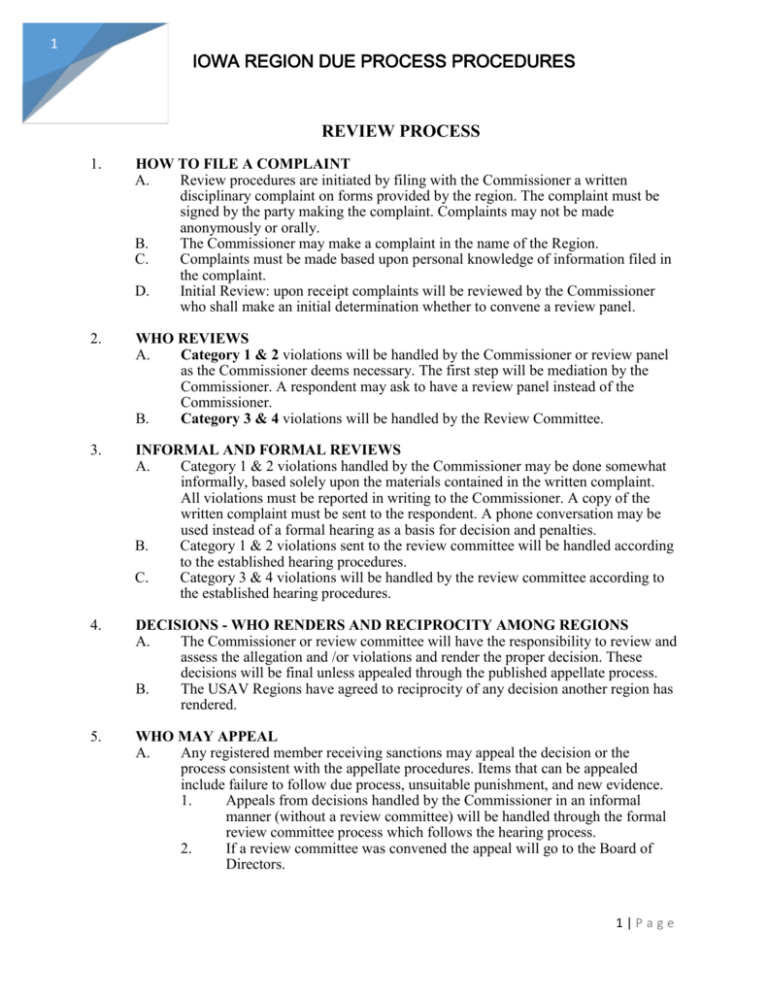Due Process Procedure
advertisement

1 IOWA REGION DUE PROCESS PROCEDURES REVIEW PROCESS 1. HOW TO FILE A COMPLAINT A. Review procedures are initiated by filing with the Commissioner a written disciplinary complaint on forms provided by the region. The complaint must be signed by the party making the complaint. Complaints may not be made anonymously or orally. B. The Commissioner may make a complaint in the name of the Region. C. Complaints must be made based upon personal knowledge of information filed in the complaint. D. Initial Review: upon receipt complaints will be reviewed by the Commissioner who shall make an initial determination whether to convene a review panel. 2. WHO REVIEWS A. Category 1 & 2 violations will be handled by the Commissioner or review panel as the Commissioner deems necessary. The first step will be mediation by the Commissioner. A respondent may ask to have a review panel instead of the Commissioner. B. Category 3 & 4 violations will be handled by the Review Committee. 3. INFORMAL AND FORMAL REVIEWS A. Category 1 & 2 violations handled by the Commissioner may be done somewhat informally, based solely upon the materials contained in the written complaint. All violations must be reported in writing to the Commissioner. A copy of the written complaint must be sent to the respondent. A phone conversation may be used instead of a formal hearing as a basis for decision and penalties. B. Category 1 & 2 violations sent to the review committee will be handled according to the established hearing procedures. C. Category 3 & 4 violations will be handled by the review committee according to the established hearing procedures. 4. DECISIONS - WHO RENDERS AND RECIPROCITY AMONG REGIONS A. The Commissioner or review committee will have the responsibility to review and assess the allegation and /or violations and render the proper decision. These decisions will be final unless appealed through the published appellate process. B. The USAV Regions have agreed to reciprocity of any decision another region has rendered. 5. WHO MAY APPEAL A. Any registered member receiving sanctions may appeal the decision or the process consistent with the appellate procedures. Items that can be appealed include failure to follow due process, unsuitable punishment, and new evidence. 1. Appeals from decisions handled by the Commissioner in an informal manner (without a review committee) will be handled through the formal review committee process which follows the hearing process. 2. If a review committee was convened the appeal will go to the Board of Directors. 1|Page 2 IOWA REGION DUE PROCESS PROCEDURES B. Any registered member receiving sanctions may appeal the decision of the Board of Directors to the Regional Operations Division Ethic Committee. The only item that can be appealed is whether due process was given at the Regional Level. 1. Appeals to the Regional Operations Division can only be made after all appellate processes at the regional level have been exhausted. 2. Appeals should be made in writing to the President of the Regional Operations Division as listed in the USA Volleyball Guide. HEARING PROCESS 1. 2. INFORMAL MEDIATION HEARINGS BY COMMISSIONER A. All allegations must be submitted in writing. The allegations should contain all relevant facts pertaining to the complaint. FORMAL HEARINGS A. All allegations must be submitted in writing. The allegations should contain all relevant facts pertaining to the complaint. Any other papers and documentation that the Commissioner or review committee will be viewing need to also be submitted with the complaint. B. The party or parties named in the allegations will be notified by registered mail of: 1) The complaint(s). 2) Complete details of the hearing to include: time, date, location. 3) The rules and procedures for the hearing and appeals. 4) All materials that will be viewed by the commissioner or review committee. 5) Possible sanctions and penalties that may be imposed. C. The named party(s) will be given seven (7) days to respond to the complaint(s) and arrange a hearing date. 3. ESTABLISHMENT OF REVIEW COMMITTEE A. The committee will be composed of 5 members selected from the review committee pool. B. The review committee pool will be composed of one member 18 years of age or older from each adult and junior team in the region. C. To avoid conflict of interest 7 names will be drawn and each side may strike one member from the review panel. D. Once the review committee is chosen, neither side may contact the committee on matters dealing with the complaint. 4. THE REVIEW COMMITTEE HEARING PROCEDURES: A. Allegations will be presented by the complainant. The complainant will be allowed to present relevant facts, materials and witnesses. B. The respondent will be able to present facts, materials, and their own witnesses and to confront the complainant and complainant’s witnesses. CONFRONTATION DEFINED: Confrontation does not always mean the right to engage in a hostile cross examination. Although such is generally favored, it may be determined, in certain specific incidences, to be inappropriate (e.g. sexual abuse of a minor). In such cases confrontation can mean the right to ask the chair of the committee to question the witness on behalf of the respondent. C. The complainant will be allowed to cross examine respondent witnesses. 2|Page 3 IOWA REGION DUE PROCESS PROCEDURES D. E. F. G. H. I. J. The review panel will be allowed to ask questions of all parties and witnesses. The complainant will be allowed to summarize their case. The respondent will be allowed to summarize their case. The review panel will go into closed session to reach a decision on whether the complaint is founded, unfounded, or undetermined (no conclusive decision can be made). The review panel will also decide on what sanctions should be imposed in closed session. If case ends undetermined no sanctions will be imposed. A majority vote is needed for a decision on the complaint and sanctions. Unanimity is not required for either the decision or the sanctions. The moderator and clerk of the review hearing will be the Regional Commissioner or a designated neutral person. The Clerk is responsible for keeping a record of the proceedings, and filing all records, exhibits, etc. Closure: 1. The written findings, decisions, any sanctions and the appeals process will be sent to all parties in the dispute and the Chairperson of the Board of Directors by registered mail. 2. This notice shall clearly state the authority for said decision and it should be clearly related to the allegations. APPEALS PROCESS 1. ALL APPEALS MUST BE PRESENTED IN WRITING A. MAIL TO THE REGION OFFICE: 4600 Park Ave, Suite 201, Des Moines, IA 50321-1367. B. MUST BE MAILED WITHIN 10 DAYS from the receipt of the final ruling by the parties. C. Any respondent receiving sanctions or the complainant may appeal the decision or the hearing process consistent with the appellate procedures. Items that can be appealed include: failure to follow due process, unsuitable sanctions and new evidence. D. The appeals panel will restrict itself to the reason for the appeal and may call such witnesses it deems important to making a ruling. The appeals is not required to be a total de novo (start anew) proceeding, if a full hearing has been held by the first decision level. E. Any registered member receiving sanctions may appeal the decision of the Board of Directors to the Regional Operations Division Ethics Committee. The only item that can be appealed is whether due process was given at the Regional Level. 1. Appeals to the Regional Operations Division can only be made after all appellate processes at the regional level have been exhausted. 2. Appeals should be made in writing to the President of the Regional Operations Division as listed in the USA Volleyball Guide. 2. COMPOSITION OF APPEALS PANEL A. APPEAL FROM INFORMAL REVIEW: The appeals panel will be composed of five review committee members if the appeal is coming from an informal hearing. B. APPEAL FROM REVIEW PANEL: If the appeal is coming from the review committee hearings the appeals panel will be composed of 3 or 5 members of the Board of Directors. 3|Page 4 IOWA REGION DUE PROCESS PROCEDURES C. The moderator and clerk of the appellate hearing will be the Board of Directors Ethics Chair or a Board of Directors Member or a designated neutral person. The Clerk is responsible for keeping a record of the proceedings, and filing all records, exhibits, etc. CATEGORIES OF INCIDENTS CATEGORY I: Routine incidents for which the Regional handbook provides an automatic penalty, fine or sanction, including but not limited to: 1. Team arriving late or with too few players. 2. Leaving the tournament without fulfilling officiating duties. 3. Competing with an ineligible, illegal, or non-registered player. 4. Not having certified officials by March 1st. 5. Using non-certified person to officiate. 6. Not paying tournament sanction fees. 7. Tournament Directors not following written tournament guidelines. CATEGORY II: Common but more serious incidents, including but not limited to: 1. Improper or inappropriate recruiting (undue pressure, false promises, post-commitment recruiting, undermining another coach, team, or club). 2. Theft of volleyball, uniform, equipment, bags, wallets, purses, etc. 3. Intentional damaging of equipment, fixtures, real estate, automobiles, etc. 4. Drinking alcohol on site. 5. Failure to fulfill sanctions imposed for Category I violations. 6. Actions that undermine or threaten another player, team or the region. CATEGORY III: Serious incidents, including but not limited to: 1. Stealing or embezzling club or region funds. 2. Drunkenness or narcotic intoxication on site. 3. Significant defamation or other action to harm the reputation of a coach, player, team, official, club or the region. 4. More serious actions which undermine or threaten a player, coach, team, official, club or the region. 5. Omitting criminal records or crimes involving juniors or otherwise falsely completing a volleyball form requesting such information. CATEGORY IV: Emergencies or dangerous threatening incidents, including but not limited to: 1. Sexual misconduct, harassment or similar inappropriate conduct. 2. Violence or threatening behavior. 3. Very serious actions which undermine or threaten a player (including oneself), official, coach, team, club, or the region. 4|Page 5 IOWA REGION DUE PROCESS PROCEDURES SANCTIONS BY CATEGORY CATEGORY I SANCTIONS: Routine incidents for which the Regional handbook provides an automatic penalty, fine, or sanction (EXAMPLES: refer to Categories of Incidents.) SANCTIONS may include private or public admonishment, monetary fines, probationary period, loss of playing privileges, service to the region, and loss of ability to host tournaments. CATEGORY II SANCTIONS: Common but more serious incidents. (EXAMPLES: refer to Categories of Incidents.) SANCTIONS may include private or public admonishment, monetary fines, probationary period, and loss of playing privileges, service to the region, loss of ability to host tournaments, loss of coaching privileges, and loss of regional membership. CATEGORY III SANCTIONS: Serious incidents. (EXAMPLES: refer to Categories of Incidents.) SANCTIONS may include private or public admonishment, monetary fines, probationary period, and loss of playing privileges, service to the region, loss of ability to host tournaments, loss of coaching privileges, and loss of regional membership. CATEGORY IV SANCTIONS: Emergencies or dangerous threatening incidents. (EXAMPLES: refer to Categories of Incidents.) SANCTIONS may include private or public admonishment, monetary fines, probationary period, loss of playing privileges, loss of ability to host tournaments, loss of coaching privileges, loss of regional membership, and possible service to the region. 1. Temporary Sanctions may be imposed for safety reasons. 2. Supervision of volleyball activities may be immediately imposed for the protection of both/all parties. 3. Immediate suspension of the right to play, coach, chaperone, officiate, etc., may be imposed. 4. If temporary sanction is imposed the following process will be followed: A. Oral notification of party(s) involved followed by written notification shall include the following information: 1. Description of complaint 2. Temporary sanction 3. Possible additional sanctions 4. The hearing process B. A Review date will be established as soon as possible. 5|Page







